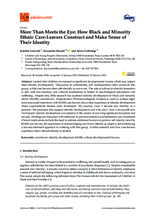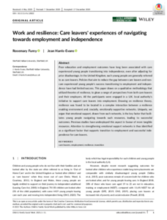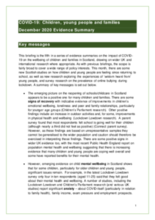Displaying 261 - 270 of 1185
This webinar event launched the report 'The digital divide: The impact on the rights of care leavers in Scotland,' which shares the findings of a focused piece of research that sought to understand care leavers' experiences of digital exclusion before and during the COVID-19 restrictions in Scotland in 2020.
"Councils have called for financial oversight of England’s privately-run children’s care homes after research showed some of the biggest private equity-owned providers were collectively making hundreds of millions a year in profits," according to this article from the Guardian.
In this study, Interpretative Phenomenological Analysis was used to analyse eight semi-structured interviews with black and minority ethnic (BAME) care-leavers about their experience of identity development.
"There are calls for foster carers to be prioritised for vaccines as more families are needed to take emergency foster children during the pandemic," says this article from Sky News.
"A wholesale independent review of children’s social care will set out to radically reform the system, improving the lives of England’s most vulnerable children so they experience the benefits of a stable, loving home," says this press release from the UK Department for Education.
"The [UK] government has launched a review of children’s social care in England, calling it a 'once-in-a-generation opportunity' to overhaul a system it says is failing vulnerable young people and creaking under the strain of rising numbers of children entering care," according to this article from the Guardian.
This paper draws on a qualitative methodology that utilized theories of resilience, to glean a range of perspectives from both care leavers and their employers.
This briefing is the fifth in a series of evidence summaries on the impact of COVID-19 on the wellbeing of children and families in Scotland, drawing on wider UK and international research where appropriate.
This brief resource from Who Cares? Scotland explores barriers to graduation for care-experienced young people, including moving placement, lack of space or equipment to study, challenges with mental health, finances, and housing, to name a few.
Based on groundbreaking original research, this book provides a comprehensive account of the issues surrounding pregnancy and parenthood for young people in and leaving care.




